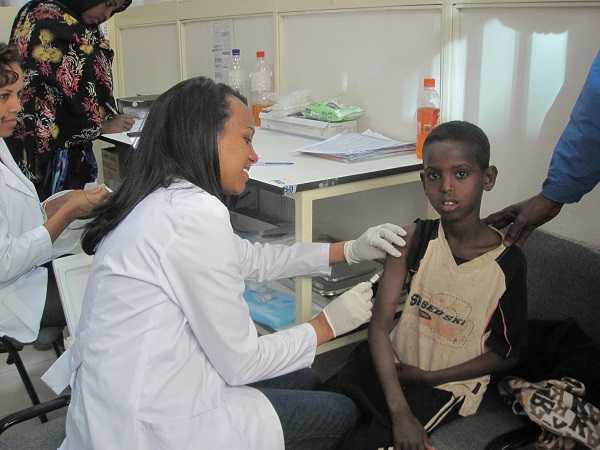US Refugee Admissions Program: Improving Health of US-bound Refugees
CDC IN KENYA BLOG
April 28th, 2014 12:00 pm ET - Warren Dalal, Program Support Unit, Immigrant Refugee Migrant Health Branch, Division of Global Migration and Quarantine

Abdi Yusuf, 12, is vaccinated at the IOM clinic in Kakuma refugee camp during the medical health assessment process for US-bound refugees.
The waiting area of the vaccination room at the International Organization for Migration (IOM) clinic in Kakuma refugee camp is buzzing with activity on this particular morning. Today is the last day of the three-day medical health assessment process for the United States (US) refugee resettlement program in Kakuma. This first round of vaccination being the last stage of their initial health assessment.
The refugees have agreed to participate in a vaccination project that will introduce multiple vaccines overseas, depending on age, before they arrive to the US. The project is a partnership between CDC’s Division of Global Migration and the US Department of State’s Bureau of Population, Refugees, and Migration (PRM). CDC and PRM are co-funding this project for approved refugee applicants in the US Refugee Admissions Program (USRAP).The goal of the project is to provide cost-effective public health interventions, improve refugee health, and limit the number of vaccinations refugees will need after they arrive in the US. In addition to Kenya, the vaccination project is being implemented by IOM with USRAP in Ethiopia, Thailand, Malaysia, and Nepal.
The refugees in Kakuma refugee camp are waiting patiently for IOM vaccination nurses to review and prepare the vaccinations. All refugees, regardless of age, will receive vaccinations prior to travel to the US. In eight weeks, the refugees will return to IOM for a booster of many of the vaccines they will receive today.
Mothers at the IOM clinic are clutching their children’s Kenya Ministry of Health “Mother-Child Booklets” that log the vaccinations their children were given as part of the expanded program on immunization in Kakuma. IOM nurses will review these documents and add the previously administered vaccines to the medical documents required for travel to the US.
In Kenya, IOM processes about 7,000 medical health assessments for US-bound refugees per year. IOM will ensure that refugees in Nairobi, as well as those in Kakuma and Dadaab-based refugee camps, will receive the necessary vaccinations prior to traveling to the US. Following vaccination, IOM will work with camp medics to find any adverse reactions and report them to CDC.
As the refugees get ready for their new homes and new lives, the vaccines will help ensure that they are healthy upon arrival in the US.
This project has been implemented in five countries and will provide vaccinations overseas to 56 percent of US-bound refugees each year, saving state and local health departments from the cost and time to provide those vaccines after the refugees reach their new homes in the US.
- Page last reviewed: April 28, 2014
- Page last updated: April 28, 2014
- Content source:
Global Health
Notice: Linking to a non-federal site does not constitute an endorsement by HHS, CDC or any of its employees of the sponsors or the information and products presented on the site.


 ShareCompartir
ShareCompartir